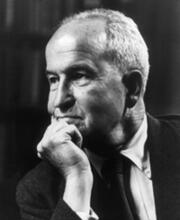Henry Murray
Personality Research

Henry A. Murray completed his undergraduate studies in history at Harvard in 1915. More than a decade later, with graduate degrees in medicine and biology from Columbia University, a Ph.D. in biochemistry from the University of Cambridge, and an expansive understanding of Carl Jung’s method of psychoanalysis, Murray was ideally suited to run the Harvard Psychological Clinic, which he did as its director from 1928 – 1937.
In addition to practicing psychoanalysis at the clinic, Murray directed a research program investigating the constituent elements of personality (e.g. emotions, preferences, behavioral tendencies and relational characteristics). The results, Explorations in Personality, were published in 1938. Murray was also a founder of the Boston Psychoanalytic Society.
Murray’s syncretic approach to psychology reflected the diversity of his training and his expansive mind. ''Not since William James has there been an American psychologist so versatile, nor has anyone else written with equal verve and boldness” (Adelson, 1981).
In 1938 Murray was recruited by the U.S. government to create a psychological profile of Adolph Hitler. He left Harvard temporarily to serve in the U.S. Army during the Second World War, working with American intelligence agencies to help assess the psychological fitness of their agents.
After the war, Murray returned to Harvard; he became a tenured lecturer in 1947, and Professor of Clinical Psychology in 1951. From 1948-1952, he worked with colleagues at the Psychological Clinic to apply and improve the Thematic Apperception Test (TAT), a projective test used to assess an individual's personality and self-understanding. The TAT has been used in numerous studies in personality and motivation, and is still used widely today as a screening tool for employers.
Murray was a central figure in the interdisciplinary Department of Social Relations (which later was folded into the Department of Psychology). He strongly advocated research into human personality that incorporated multiple methods to capture as many facets of an individual as possible. As both a teacher and a researcher, Murray had a profound influence on his colleagues and students. He retired from Harvard in 1962.
In 1976, the Henry A. Murray Research Archive was founded at Radcliffe College to honor the multidisciplinary principles of Murray’s work in personality theory. The Murray Research Archive is a multi-disciplinary research data archive and a national repository for data in the social sciences, including economics, political science, psychology, sociology, and human development.
Sources
Fowler, G (1988). “Henry A. Murray is dead at 95; Developer of personality theory.” The New York Times, June 24, 1988.
Harvard University Library Online Archival Search Information System (2007, April 19). Murray, Henry Alexander, 1893- Papers of Henry A. Murray : an inventory Retrieved on December 10, 2007 from: nrs.harvard.edu/urn-3:HUL.ARCH:hua09001
Henry A. Murray Archives, Retrieved on December 10, 2007 from: http://murray.harvard.edu
Adelson, J. (1981). Against scientism. The New York Times, August 9, 1981.